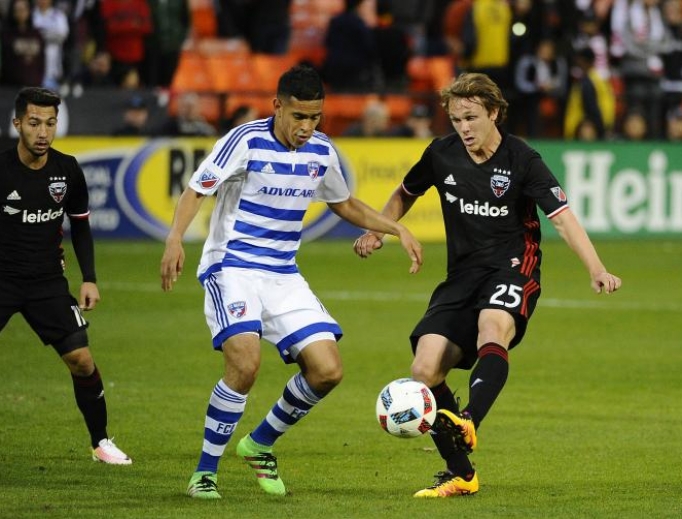Pro Soccer Player’s Sense of Purpose and Community Confirmed
D.C. United Midfielder Jared Jeffrey influenced by teammate’s transformation.

Jared Jeffrey has played top-lever soccer for years. He was even named Parade’s high-school player of the year in 2008 and decided to forgo collegiate play, signing a professional contract with a Belgian team. He later played with a German team and has been with D.C. United since 2013.
While Jeffrey has never found soccer lacking as a sport, he had been in an incomplete mode regarding religion. Although baptized a Catholic, the energetic Dallas, Texas, native drifted away from the Church, especially while in Europe. The sight of his teammate Taylor Kemp being drawn into the Church — and the peace of mind that brought him — led Jeffrey to make his own move toward being a fully participating Catholic.
Jeffrey spoke to the Register about his reversion and D.C. United’s plans for 2017, as their regular season opener against Sporting Kansas City on March 4 approached.
Last year, D.C. United turned its season around and made the playoffs. Do you want to build on that success this season?
For sure. We did really well in the second half of last year, and we also thought that we could have gone further in the playoffs, so that will be motivating us this year. In order to achieve that, we have to be consistently cohesive. That way we can prevent opponents from scoring and score more ourselves. We’re optimistic about doing that this season.
What do you enjoy most about soccer?
I like getting out and competing against other guys. That’s so much the case that I don’t even like warmups, because in those you’re not going 100%. Warmups are kind of like a waiting area for when the real action will begin, and the real action is where I like to be.
With a lot of other sports, the play is very routine. In football, you have the game broken up into snaps where everyone lines up for a set play. In soccer, there’s a much more fluid dynamic going. Things can change instantly, and they don’t stop as frequently. You have to adjust mentally all the time in soccer, because it’s a constant flow of play, with all kinds of possible turns. I like that.
You were named the Parade player of the year in high school. Was that something you aimed at or simply a byproduct of playing well?
Soccer, for me, has never really been about awards or trophies or things like that. I just go out and play whatever game I’m in on that given day. That’s where all my energy is at, so I don’t look far ahead, especially to things that aren’t in my control, like being named MVP or as a member of an all-whatever team. I leave the big picture stuff to God and trust that things will work out well.
Has Taylor Kemp helped you to do that even more in professional soccer?
Yes, Taylor is someone I really respect a lot — as a player and as a man. I think it’s neat that he chose, on his own, to become a fully practicing Catholic. His religious beliefs are not just what he has been told to accept, but what he has accepted as an adult in a fully conscious way.
I’ve kind of known all along that there are more important things in life than soccer, but Taylor’s story has refined that belief for me even more. It even influenced me to get confirmed last November, since I had been baptized but had never been through confirmation.
The strength of the Holy Spirit we receive in confirmation is taken for granted a lot, but if we want to be empowered by it, we are always free to do so. Prayer is what makes this happen, and I’ve been praying a lot more than I used to. My prayers were more formal and less frequent in the past, but now I pray in the car, at the stadium, in the hotel — wherever I am, really.
As you’ve become more personally invested in the Church, have you learned things about Catholicism that have surprised you?
Probably the biggest surprise, which is also a huge relief and blessing, is that the Church is not just about “don’ts.” It’s about a personal relationship with Christ. It’s easy to get the idea, especially as a kid, that being Catholic means “you can’t do this, and you can’t do that.” What I’ve learned, though, is that the most fundamental thing about being Catholic is not negative, but positive.
Certain things are prohibited so that they won’t impede our happiness; they would prevent us from being fully united to Christ. That unity is the most important thing. It’s a positive, life-affirming pursuit that we are called to participate in. Merely having a set of negations doesn’t inspire too many people, but a proactive program like that does inspire people.
The analogy to soccer is like this: If you constantly told kids things like “Don’t trip over the ball,” “Don’t miss this shot,” or “Don’t be a ball hog,” then they’d think soccer was not much fun. It would just be about avoiding pitfalls. There are things to avoid in order to play well, but the playing well part is the major point, and it ideally concludes in victory. You have to give kids something positive to strive for in soccer, and religion is the same way. It’s about living a good life so you can have the ultimate victory of eternal life.
Do you find a sense of community in the Church that had not been in your life before?
The community aspect is another thing that surprised me. I was so pleased to see how easy it was to interact with like-minded people. The parish I’m at now is very friendly, so it seemed natural to go to classes, get confirmed and become a regularly participating member. There was no huge obstacle to overcome.
I’m not a big “what if” guy, but sometimes I look back and wish I had been more mature when I was in Europe from age 18 to 22. I played soccer and had friends on the teams I was with, but I didn’t see as much of Europe as I could have, and that includes the countless Catholic things that make up the continent’s rich history.
I had already drifted away from Catholicism a bit in high school, but in Europe I was completely unconnected to the Church. It would have been great to go to Masses in the beautiful churches over there. The languages would have been different, but some of the churches are so amazing, I probably wouldn’t have even noticed the language.
My dad said all Masses used to be in Latin, which got my interest. I’d like to go to a Latin Mass, and I’m told there are some in Maryland and quite a few in Virginia. Maybe Eddie Gaven can let me know which location would be best to go for a Latin Mass, since that is his preference. It is becoming the preference of more and more Catholics since Pope Benedict helped to make it more common about 10 years ago.
Did you choose a saint for confirmation?
I chose St. Peter. I like how, when Jesus told him to cast his nets on the other side of the boat, he could have refused, but even though he didn’t understand what he was told, he still trusted in Jesus. He did what Jesus instructed him to do, which took humility. That’s the kind of active trust I admire — not knowing entirely why we should do certain things, but stepping out in faith with the assurance that Jesus knows more than we do and that he can only will our good. Our good is what led him to the cross in obedience to the Father.
After St. Peter cast his nets into the water, he caught a huge amount of fish and marveled at what happened. He realized how sinful he was and even told Jesus to leave him, since he thought his sin was incompatible with someone of Jesus’ stature. He was corrected on that and was told that he would become a fisher of men. Jesus came to forgive sins and even uses sinners to do it. Our sins are no match for his omnipotence. Once we know that, all that’s left on our part is active trust.
Register correspondent Trent Beattie writes from Seattle.
His book, Fit for Heaven (Dynamic Catholic, 2015), contains numerous Catholic sports
interviews, most of which have appeared in the Register.
- Keywords:
- faith and sports
- soccer
- trent beattie

















